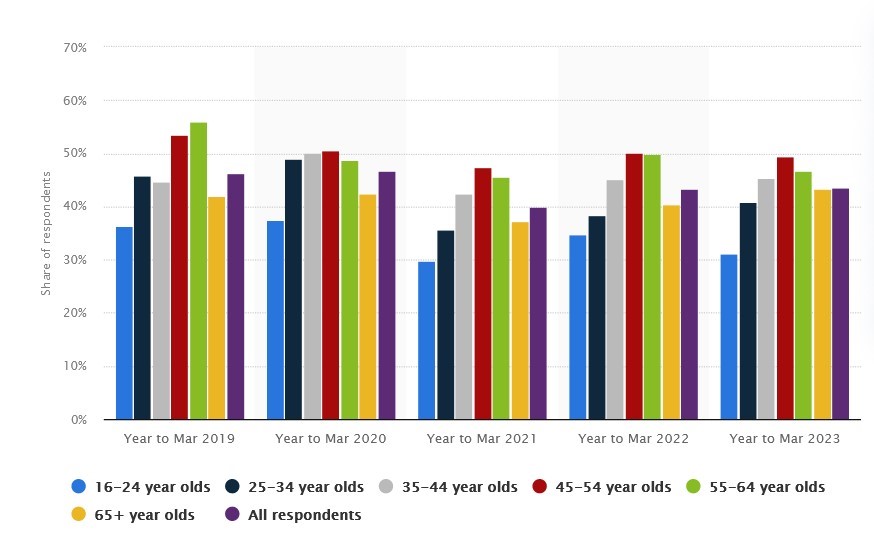UK Gambling Laws 2026
Gambling in the UK is big business. According to a recent study by Statista, an estimated 44% of Brits aged 16 and older contribute to the annual gross spending of £14 billion in Great Britain. And with so much money and so many people taking part in gambling, it’s no wonder that the government has such a keen interest in this area. As a whole, these regulatory interventions tend to lead to positive changes. However, one side effect of these amendments is an ever-shifting landscape of gambling legislation. These constant revisions can be confusing, but they’re important. With that in mind, we’ll be looking at their changes in the United Kingdom and what it means for you as a player in 2026.
What You Need to Know About the New Gambling Laws in the UK
The big news in the UK is the 2023 revision of the UK Gambling Act 2005. It seeks to not only deal with problems that have been plaguing the gambling industry for a long time, but also introduce gambling regulations to protect young Brits from developing problem gambling habits.
UK Gambling Act 2005 (2023 Revision)
The UK Gambling Act 2005 covers just about everything there is to know about gambling. Since being signed into law, it has undergone four main revisions. The first in 2007, another in 2008, the third in 2014, and the latest coming in 2018. As a whole, these revisions have been positive—tackling issues like underage gambling, illegal gambling sites, gambling as a channel for money laundering, and problem gamblers protection.
But the proposed 2023 revision is different—seeking to change the way the average user plays.
Video by SkyNews summarising the key aims of the 2023 revision
In short, it seeks to:
- Subject certain accounts to affordability checks
- Introduce new online casino regulations regarding stake limits
- Introduce a statutory levy for research into gambling.
From this, it appears that sports betting and gambling in person will remain relatively unchanged, with online casinos looking to be the main target. Online slots especially are set to undergo a large number of changes.
The goal of this revision is to not only find out more about how gambling affects various people, but also to take preventive measures in protecting those that the government deem most likely to develop gambling problems.
How Does Gambling Work in the UK?
Gambling in the UK is regulated by The Gambling Commission of Great Britain. The laws themselves are decided upon and passed by parliament—although it is The Gambling Commission that is responsible for making sure that gambling legislation is followed. Additionally, as in the case of the 2023 revision, they will also submit their recommendations.
The Gambling Commission’s authority extends to online gambling as well. So all online casinos that wish to operate in Great Britain must first seek the proper licensing from them, and then abide by their guidelines. These guidelines include specific gambling rules and the implementation of KYC verification. Failure to comply with any of these laws can result in the revocation of a licence.
For players, the rules are a lot simpler. To clear all doubts about how old you have to be to bet and play at casinos: so long as you are a permanent resident of the UK, have reached the legal gambling age in the UK of 18+, and are not on the GamStop list, you will be permitted to register and sign up to the online gambling site of your choice.
The graph below provided by Statista gives a look at who is gambling in the UK.
The most recent data come from 2023, with the overall numbers showing that an estimated 44% of Brits partake in some form of gambling at least once a month. People aged 45–54 & 55–64 generally are the most likely to gamble, with ~48% of respondents in those categories admitting to having gambled in the past month. Meanwhile, 16–24 is the least, sitting at ~31%. Despite being the smallest, it’s that of 16–24-year-olds which is the category of most concern for both the Parliament and The Gambling Commission. As such, this age group will have the most limited gambling options.
Current Gambling Laws in the UK Vs Proposed Laws
Most of the proposed changes will affect how online gambling sites run behind the scenes. Though for the average user, there are still a couple of changes you’ll need to keep in mind. The table below shows some key aspects that are likely to change.
| Current Laws Vs Proposed 2023 Revisions | ||
|---|---|---|
| Current Laws | Initial Proposed Revision | |
| Casino Age Limit | 18 | 18 |
| Maximum Stake for Slots | None | £15 |
| Maximum Stake for Slot Users 25 or Younger | None | £2 |
| Affordability Checks | Voluntary | Players who lose £1,000+ in 24 hours OR £2,000 over 90 days |
| Passive Affordability Checks | None | Player who loses £125 in a month or £500 in a year |
Perhaps the biggest talking point is the affordability checks. They will be part of new casino regulations designed to protect potential problem gamblers and make sure that they are unable to rack up debts that could damage their future livelihood.
Of course, there’s been many opponents arguing that it would be an invasion of privacy. However, The Gambling Commission has stated that these passive checks will only require gambling sites to review information about the user that is already available online. Meanwhile, the active checks are promised to be non-invasive—drawing comparisons to what users would have to do to receive a loan. Further, as a whole, it’s expected that only 20% of users will have either applied to them.
The other significant change is stake limits. Currently, there are no specific sections of the UK Gambling Act or other fruit machine laws in the UK that deal with maximum stakes for online slots. But under the proposed amendment, gambling restrictions would be applied to online slots to ensure stakes between £2 and £15 per spin. This would bring it closer to the maximum stakes imposed on physical slots.
What the Future Looks Like & Recent Updates
With a statutory levy being included in the 2023 amendment, research on how gambling affects different types of people will continue. And if history is anything to go by, gambling restrictions will become tighter. While the initial proposal for the maximum stake of online slots was £15, in February, the government announced that it would be lowered to £5. This brings it in line with the restriction on its physical counterpart. But recent interviews with MPs suggest that this might just be the beginning.
There is, however, clear evidence that a £2 limit should be in place for everyone to prevent harm. — MP Carolyn Harris
Although it’s unlikely that this will occur in this current batch of gambling regulation revisions. Other planned changes for the future include slowing down slot machines and getting rid of the autospin features.
While all of the above is planned, it’s important to know that it isn’t guaranteed. The addition of maximum online slot stakes is slated to come into effect in September 2026, and these are very likely to occur. However, for the other amendments to gambling regulations, it’s important to remember that the United Kingdom is getting ready for its next general election in early 2025. As such, further developments will likely not occur until mid-2025.
But while the ‘when’ might not be certain, we do have a pretty good idea of the ‘what’.
References
- “Affordability and customer’s personal circumstances”. Gambling Commission, September 21, 2023, https://www.gamblingcommission.gov.uk/licensees-and-businesses/guide/page/affordability-and-customers-personal-circumstances. Accessed April 16, 2026.
- Department for Culture, Media and Sport, The Rt Hon Lucy Frazer KC MP, and The Rt Hon Stuart Andrew MP. Major reform of gambling laws to protect vulnerable users in smartphone era. GOV.UK, April 27, 2023, https://www.gov.uk/government/news/major-reform-of-gambling-laws-to-protect-vulnerable-users-in-smartphone-era. Accessed April 16, 2026.
- “Gambling white paper: These are the new gambling laws being proposed”. Sky News, April 27, 2023, https://news.sky.com/video/gambling-white-paper-these-are-the-new-gambling-laws-being-proposed-12867649. Accessed April 16, 2026.
- “Participation in gambling by age, Great Britain 2023”. Statista, February 20, 2026, https://www.statista.com/statistics/472731/gambling-participation-age-uk/. Accessed April 16, 2026.
- “What’s covered in the Gambling Act White Paper?” iGB. April 28, 2023, https://igamingbusiness.com/legal-compliance/legal/whats-covered-in-the-gambling-act-white-paper/. Accessed April 16, 2026.











